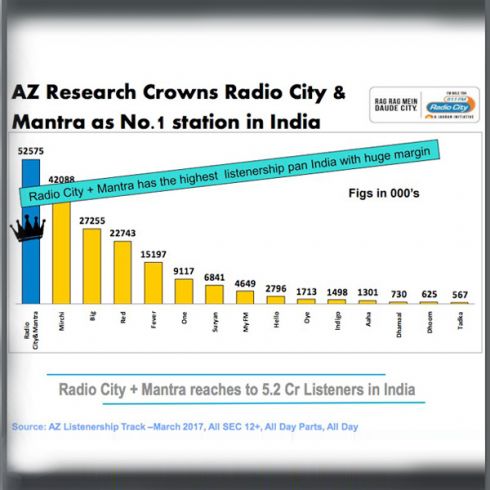
MUMBAI: Radio City has maintained its listenership stronghold across the nation, according to the latest radio listenership survey conducted by AZ Research. The AZ research survey shows that Radio City holds the top position with a listenership across 5.25 crore Indians.
The AZ study was conducted across 23 cities amongst SEC 12+ All Day part to understand the FM Radio listening behaviour vis-a-vis other mediums. The report summarizes city wise as well zone wise listenership data and shows trends in each part of the country.
In 15 out of 23 cities, Radio City tops the chart as the most recalled station as per the recent AZ survey. Radio City is a leader in National Capital Region with 92.78 lakh listeners and also emerged as the most preferred radio network with a listenership of 2.2 crores in the Western India markets.
Seeing Mumbai garner a reach of 84.93 lakh listeners, Radio City Ahmedabad touching the lives of 41.26 lakh listeners and Pune pulling in with 34.97 lakh listeners they stand by our philosophy of ‘Rag Rag Mein Daude City’. This philosophy aims to invoke the feeling of City Pride amongst the citizens and galvanizes a stronger emotional connect with the listener through a ‘micro-local’ content approach that reflects the city’s fabric, culture and nuances.
Radio City dominated the southern market by reaching across 1.3 crore listeners in Bangalore, Chennai, Hyderabad, Coimbatore and Vizag.
Radio City EVP and National Head – programming marketing AudaCITY Kartik Kalla said, “As AZ Research suggests that radio reaches to a much wider audience as compared to Television. Reaching 5.25 crore Indians has reiterated what we have always believed in - the fact that India’s first private FM with 15 years of radio expertise is the number 1 radio network across the country.”
For detailed information about AZ research analysis, refer the link below:
http://www.azresearch.in/articles/Radio_City_ResearchSMP_2017.pdf